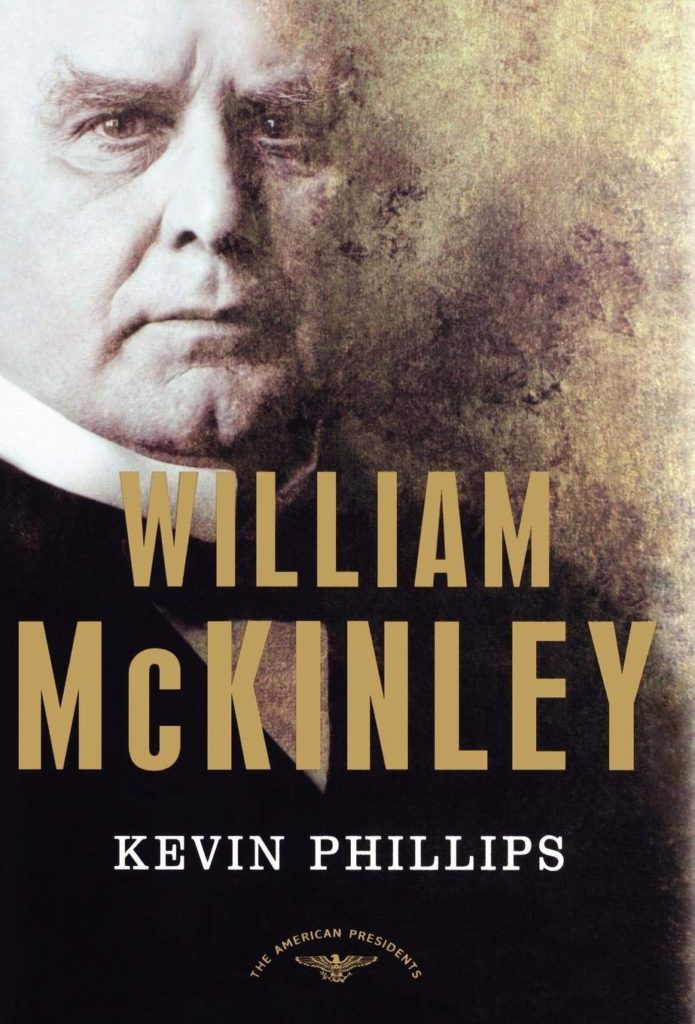“For the best reason in the world, to get my bill passed. My idea was to get the act through Congress, and to make necessary reductions later.”
William McKinley, when asked years later why he accepted much higher tariff rates than he wanted in 1890
It’s a crying shame that William McKinley is mostly remembered as the guy who got shot, making Teddy Roosevelt the president. Kevin Phillips argues in his American Presidents Series entry that McKinley was a great commander-in-chief, ranking just below the all-timers like Washington, Lincoln and FDR. I’m mostly buying what Phillips is selling, but would probably throw in several others between him and the Big Three.
McKinley was at the crux of many consequential shifts in American politics, foreign policy and presidential action. A humble Midwesterner with a penchant for the Bible, patriotic tunes and unceasing care for his invalid wife, the 25th President was a stand-up guy. He volunteered to defend striking coal miners in 1876 even though people said it would hurt him politically. He turned down high paying jobs and speaking fees as a congressman, thinking it at odds with the spirit of public service. When campaigning in cities like Cincinnati and New Orleans he changed hotels if he found out they would not admit black men he was set to meet. In support of women’s suffrage, he hosted fellow Buckeye Victoria Woodhull as she campaigned (for president!) in 1872 as the choice of the Equal Rights Party.
Despite his mild manner and aww shucks appeal, McKinley was no shrinking violet. He survived the worst of the Civil War. The last eventual president to serve in the conflict, McKinley mustered under another future leader. Future president Rutherford B. Hayes thought William “an exceedingly bright, intelligent, and gentlemanly young officer” and “one of our best.” Hayes would support the younger Ohioan in politics later on. McKinley became a hero of sorts at the Battle of Antietam, the bloodiest single day in American history. During the chaos, McKinley rode behind enemy lines and rounded up stragglers, prepared food for the men and drove a wagon across enemy fire to deliver it to his Union brothers-in-arms, making sure every man in the regiment got rations. He got a monument for his efforts after his death.
McKinley is perhaps best known for his legislation around tariffs. As Chairman of the House Ways and Means Committee (the one that writes all the tax laws), McKinley crafted a protectionist scheme that would make any “Buy American!” billboard reader beam. Considered by many as a front man for big corporations, trusts and aristocrats, he pushed the tariff as hard and fast an any president before or since. McKinley wanted to reflect the old Henry Clay American System to protect American labor and prices. But he had to make compromises, as referenced in the quote that kicked off this post. From author Kevin Phillips directly, “McKinley’s rare, if not unique, competence lay in understanding both the purpose and the validity of the protective phase and the later need to modify it – as the Dutch and British had in their day – to meet changing and globalizing circumstances.” McKinley ensured a “full dinner pail” for the hard working plain folks and largely delivered. Stock markets sky rocketed during his first term and it fulfilled the Republican promise to boom the Democratic bust that lead to his election in the first place. By 1899, the US was exporting almost twice what it was importing and was quickly becoming a world leader in many manufactures. The protection scheme was working wonders for the US economy.
Unfortunately for Willy Mac, even war heroes don’t get a pass for declaring war. If there is any resume point where McKinley gets routinely crushed by historians, it is for jumping into what became the Spanish-American War. Lasting lasting just a few months and, ostensibly, centered on Cuba’s desire for independence, McKinley gave into a wave of forces that ultimately overwhelmed him. “Yellow journalists” (#fakenews) like William Randolph Hearst and Joseph Pulitzer (yes, that Pulitzer) ran sensational stories about atrocities in Cuba to drive national fervor and, of course, sell more papers. The Protestant clergy called for aide to the Cubans against the Catholic-invader Spaniards. Political warhawks with visions of national grandeur and a general public bursting with patriotism even led to talk of Congress overriding a veto for war measures if the president chose to do so. Advisors told McKinley that the 1900 election would be at best in doubt or surely lost if he failed to go to war. He had wanted to avoid it, but ultimately succumbed. The result was bloodshed where there could have been diplomacy and the United States taking a flying leap into global imperialism. At least he can say his side won, I guess.
Students of American history should get to know William McKinley. His election in 1896 ushered in a wholesale shift to Republican control of the federal government with the GOP holding the presidency and both houses of Congress for the next 14 years. If Teddy Roosevelt hadn’t split the party after Taft’s term in 1912, that control likely would have lasted another two decades until FDR and the New Deal. McKinley christened a new century, shifted more power from Congress into the office of the executive and blazed a trail as arguably the first real national campaigner. His shocking death lead to the permanent protection of the President of the United States (it only took three assassinations, but who’s counting?). He guided the American economy from a depression when he entered office to booming enterprise when he left. And, love it or hate it, the Spanish-American War took America’s empire building overseas and the nation has never looked back.
History tends to forget one-and-done presidencies. Even though McKinley was elected for second term, he was killed just six months into it and the legend that was Teddy Roosevelt ascended which, ultimately, greatly overshadowed his predecessor. TR gets the limelight, but William McKinley laid the foundation and tipped the scales to his party’s favor for a generation.
Trivia
- First incumbent president to visit California.
- Arguably the first real campaigner. Gave 371 speeches in 300 cities in front of over two million people in the 1894 midterm campaigns, largely crushing the Democrats for screwing up the economy by promoting free trade (specious as the argument may have been). He helped gained many House seats for Republicans and boosted his 1896 stature, where he would campaign hard again.
- Enlists as private in 23rd Ohio Volunteer Infantry in 1861 under future president Rutherford B. Hayes. Eventually promoted to brevet major.
- Attended Allegheny College in Meadville, PA.
- 4-termUS House Representative from Ohio.
- Twice Governor of Ohio.
- During presidency, acquires the Philippines, Puerto Rico and Guam from Spain after the Spanish-American War.
- 1901 – shot by an anarchist at the Pan-American Exposition at Niagara Falls on Sept 6. Dies from wound on Sept 14.
- Teddy Roosevelt was actually his second Vice President and began his term upon McKinley’s second inauguration in March of 1901. McKinley’s first VP, Garret Hobart, died in office in 1899 and McKinley spent the last year+ of his first term without a second banana.
- Courted the press and used the “bully pulpit” as much as TR would later. Formalized relations between the White House and the press.
Follow-up Reading
- The Bully Pulpit by Doris Kearns Goodwin
- William McKinley and His America by H. Wayne Morgan
- The President and the Assassin: McKinley, Terror and Empire by Scott Miller

